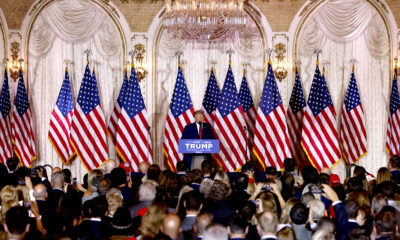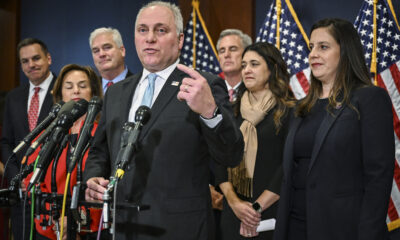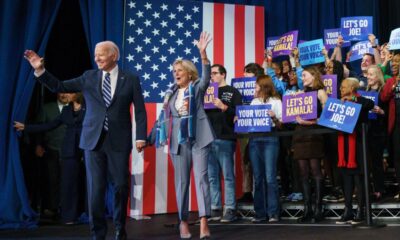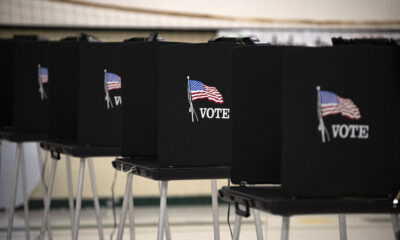International
Republicans unanimously back JD Vance as Trump’s vice presidential nominee
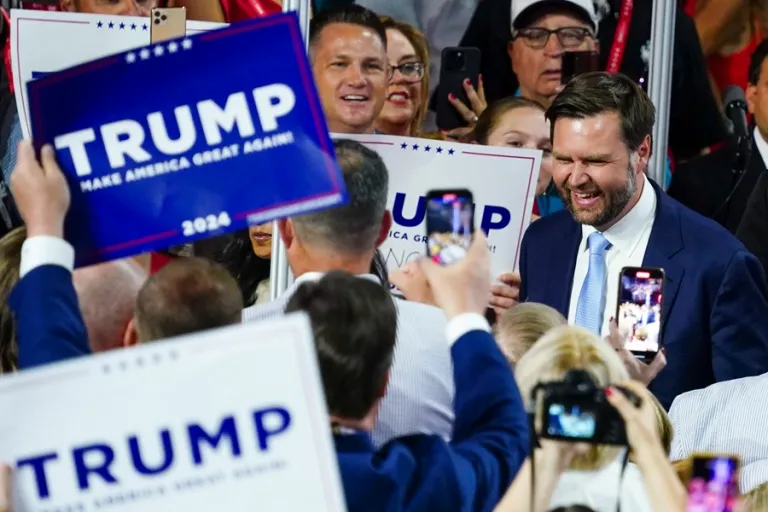
Delegates gathered at the Republican National Convention unanimously approved on Monday the selection of Ohio Senator JD Vance , a 39-year-old who is also a politician and businessman and writer, as Donald Trump’s presidential running mate.
Vance made a surprise appearance on stage at the convention, which kicked off Monday in Milwaukee, where he was given a standing ovation by those present, who gave him a resounding yes.
He did so accompanied by his wife, Usha Vance, and did not give a speech, as he will officially speak on Wednesday.
After several weeks of uncertainty, Trump announced his choice on Monday on the Truth Social network during the first day of the Republican Convention, a few minutes before his own candidacy for the White House was formalized.
Trump said that after “long deliberation and reflection, and considering the tremendous talents of many others,” he decided that Vance is “the most suitable person to assume the position.”
During the campaign, he noted, he will focus strongly on the people for whom he fought so brilliantly, the American workers and farmers in Pennsylvania, Michigan, Wisconsin, Ohio, Minnesota and far beyond.”
As vice president, he added, he will “continue to fight” for the Constitution, support the troops and do everything he can to help “make America great again.”
Trump recalled to Truth Social that Vance served in the Marine Corps, graduated from Ohio State University in two years, Summa Cum Laude, and also from Yale Law School, where he was editor of The Yale Law Journal and president of the Yale Law Veterans Association.
Vance’s book “Hillbilly Elegy” “became a huge bestseller” and was turned into a movie, the former president said, adding that “he has had a very successful business career in technology and finance.”
JD Vance was the front-runner on a list that also included Florida Senator Marco Rubio, South Carolina Senator Tim Scott, North Dakota Governor Doug Burgum and Virginia Governor Glenn Youngkin.
In recent hours, even former US ambassador to the UN and former governor of South Carolina Nikki Haley, the latest to throw in the towel in the primary process against Trump, and even Robert F. Kennedy Jr., an independent presidential candidate, had begun to be considered.
Earlier Monday, it was leaked that both Rubio and Burgum had been notified that they would not be chosen, thus putting the spotlight on Vance, whose announcement was greeted with applause at the convention as soon as it was made public.
Central America
Senator Van Hollen Meets with Deported MS-13 Member in El Salvador; Trump and Bukele React

U.S. Democratic Senator Chris Van Hollen, representing the state of Maryland, held a meeting in El Salvador with deported MS-13 gang member Kilmar Ábrego García, a member of the criminal group classified by the U.S. government as a terrorist organization.
“Kilmar Ábrego García, miraculously resurrected from the ‘extermination camps’ and ‘torture chambers,’ now sipping margaritas with Senator Van Hollen in the tropical paradise of El Salvador!” wrote President Nayib Bukeleon X (formerly Twitter), sharing photos of Van Hollen, Ábrego García, and a lawyer sitting together at a Salvadoran hotel.
The deported gang member is seen wearing a plaid shirt and a flat-brimmed cap, seated at a table with glasses and coffee cups. The senator also shared images of the meeting on his own social media accounts.
Bukele reaffirmed that Ábrego will remain in El Salvador and will not be returned to the United States.
“Now that his health has been confirmed, he has earned the honor of remaining under the custody of El Salvador,” Bukele added.
Former U.S. President Donald Trump criticized the senator’s meeting with Ábrego on Truth Social, calling Van Hollen “a fool” for advocating for Ábrego’s return to the U.S.
International
Pope Francis Appears for Easter Blessing, Calls for Peace and Religious Freedom

Pope Francis, still recovering from pneumonia, appeared on the balcony of St. Peter’s Basilica in the Vatican on Easter Sunday and, with a faint voice, wished a “Happy Easter” to the thousands of faithful gathered to celebrate the Resurrection of Christ.
A month after being discharged from a lengthy hospital stay, the presence of the 88-year-old pontiff had remained uncertain, with the Vatican not confirming his attendance ahead of time.
Eventually, the pope made a brief appearance in a wheelchair shortly after 12:00 p.m. (10:00 GMT) to deliver his traditional “Urbi et Orbi” blessing (“to the city and to the world”).
Although no longer wearing an oxygen cannula, the Argentine Jesuit relied on a close aide to read his Easter message, which touched on major global conflicts.
Francis condemned the “dramatic and unworthy humanitarian crisis” in Gaza and called for a ceasefire, while also expressing concern over the “growing climate of antisemitism spreading across the globe.”
He further emphasized the importance of religious freedom and freedom of thought, stating that without mutual respect, “peace is not possible.”
International
Thousands rally nationwide against Trump’s threat to U.S. democracy

Thousands of protesters gathered on Saturday (April 19, 2025) in major cities like New York and Washington, as well as in small communities across the United States, in a second wave of demonstrations against President Donald Trump. The crowds denounced what they view as growing threats to the country’s democratic ideals.
In New York City, demonstrators of all ages rallied in front of the Public Library near Trump Tower, holding signs accusing the president of undermining democratic institutions and judicial independence.
Many protesters also criticized Trump’s hardline immigration policies, including mass deportations and raids targeting undocumented migrants.
“Democracy is in grave danger,” said Kathy Valyi, 73, the daughter of Holocaust survivors. She told AFP that the stories her parents shared about Adolf Hitler’s rise to power in 1930s Germany “are happening here now.”
In Washington, demonstrators voiced concern over what they see as Trump’s disregard for long-standing constitutional norms, such as the right to due process.
-

 International4 days ago
International4 days agoArsenal stun Real Madrid at the Bernabéu to reach Champions League semifinals
-

 Central America3 days ago
Central America3 days agoNicaraguan Exiles to Mark 7th Anniversary of 2018 Protests with Global Commemorations
-

 International3 days ago
International3 days agoDominican ‘False Hero’ Arrested for Faking Role in Nightclub Collapse That Killed 231
-

 International4 days ago
International4 days agoBogotá residents line up for yellow fever vaccine amid national alert
-

 International2 days ago
International2 days agoACLU seeks emergency court order to stop venezuelan deportations under Wartime Law
-

 International4 days ago
International4 days agoDeSantis’ immigration crackdown sparks alarm in Venezuelan Communities in Doral
-

 Central America2 days ago
Central America2 days agoUN complaint filed against Costa Rica over detention of migrant children
-

 International4 days ago
International4 days agoMexico refuses to restore ties with Ecuador while Noboa remains in office
-

 International18 hours ago
International18 hours agoThousands rally nationwide against Trump’s threat to U.S. democracy
-

 Central America23 mins ago
Central America23 mins agoSenator Van Hollen Meets with Deported MS-13 Member in El Salvador; Trump and Bukele React
-

 International24 mins ago
International24 mins agoPope Francis Appears for Easter Blessing, Calls for Peace and Religious Freedom














